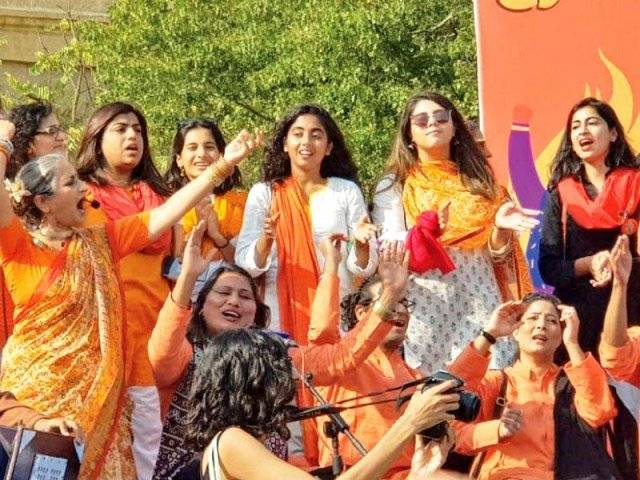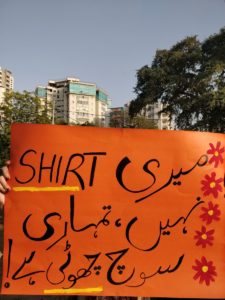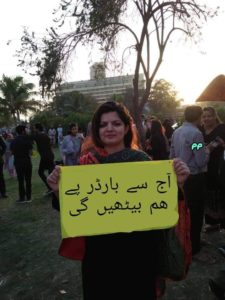
Ailia Zehra deconstructs the meaningless outrage on a section of social media over some Aurat March slogans
Women in Lahore, Karachi, Islamabad and various other cities were on streets as part of the Aurat March on Friday to mark International Women's Day. The manifesto for the march was based on a wide array of issues pertaining to gender inequality and social injustice.
Implementation of Protection Against Harassment of Women at the Workplace Act 2010 at all workplaces was one of the demands put forth by the marchers. Sexual minorities were also mentioned in the manifesto and the marchers demanded a safe working environment for them. But like last year, some users on social media ignored the demands and began questioning the content of the placards on display at the march, deeming it 'inappropriate' and 'vulgar'. Here are some of the posters from the march that seemed to have angered the members of the meninist brigade.

If you like dupatta so much, wrap it around your eyes
Agar dupatta itna pasand hai tou aankhon pe baandh lou. This slogan infuriated the misogynist lot because the argument that they use to counter complaints of sexual harassment is that the woman should have dressed modestly and covered herself with a dupatta to avoid getting into such a situation. When such men are told to try and lower their gaze if they feel 'provoked' by women without dupattas, their fragile masculinity is hurt.

My shirt is not short, it's your mindset that is narrow
Moral policing of women's bodies was one of the complaints that the marches raised their voices against. Female students were particularly upset with university administrations setting unusual dress codes and banning jeans and sleeveless shirts for women students. This placard tells the moral police that it's their narrow mindedness which is problematic. It is also a message to those who resort to character assassination and comment on the way a woman dresses to invalidate and dismiss her opinion. Women politicians, activists and journalists who use cyber space to express their opinions on sensitive issues are almost always the victims of this kind of vitriol. And this kind of behaviour is so normnalised that men think a woman who does not conform to the standards of 'modesty' should be prepared to be abused for her choice of dress. Because masculinity so fragile..

Yes, I am unchastened and characterless
Women who dare to challenge the patriarchy by standing up for themselves and against the regressive societal norms have mud thrown at them and become the subject of mudslinging. Because nothing challenges toxic masculinity more than a woman standing up to patriarchal norms created to subjugate them. This placard gives a shut up call to all those who call women names to prove them wrong. If a woman gets called 'awaara' or 'bad-chalan', rest assured she is doing something right!

Let us (women) sit at the border
The war hysteria witnessed between India and Pakistan in the past few days was condemned by feminist activists in both countries. The way warmongers (mostly men) on both sides were cheering on war is also linked to the toxic masculinity that is responsible for almost all forms of violence against women. This placard advocates for women taking over the affairs on the borders. Considering that the men at the helm of affairs have failed to do their job and are fanning flames of hatred, women will certainly do a better job at restoring peace in the region!

I don't know where your socks are
And this one certainly takes the cake! Household chores and cooking and cleaning is something only women are supposed to do. Every time a man is told to help women in the kitchen, the fragile masculinity is challenged. We know this because the famous slogan from last year's Aurat March "Khaana khud garam ker lou" (Heat your own food) offended misogynists so much that they continued whining over it for the whole year.
And of course, women are also supposed to know where their men's clothes and socks are. That's another gender-defined role. Those who are upset over such placards say the women movement should not be reduced to the 'petty' issues about who will do the household chores. Here is something for them to note: Feminist organisers explore themes of their protests within local contexts, and they have every reason to do so. Most critics of the march must be unaware of the consequences a woman might have to face if she refuses to do the household work or doesn't do it well enough. Oftentimes when a woman doesn't meet the criterion of a 'good housewife' she becomes the victim of toxic masculinity. There have been instances where women were abused and even killed for not making good food. In 2015, a man in Lahore killed his daughter for making 'bad' bread. Although he was sentenced to death later, he initially tried to use the law to pardon himself as the legal heir of the slain girl. This incident is enough to prove that masculinity is hurt when a woman does not conform to the gender roles, and also shows why it is important to tell men that doing household chores is not a woman's sole responsibility.

No to dowry, yes to share in property
Inheritance rights for women are another issue that remains unresolved even in 2019. In the patriarchal society, women either willingly give up their share in properties in favour of their brothers or are forcibly deprived of it by the men of their families. Because it is thought that giving them dowry at the time of their marriage should suffice. The placard challenges this patriarchal notion by making it clear that women need share in property and not dowry. About time men understood it!

If Cynthia does it, she's applauded. If I do it, I'm the villain
For the uninitiated, Cynthia Ritchie is an American social media influencer who has been engaging with Pakistani journalists and activists on Twitter. Most of her exchanges with them were unpleasant as she had been accusing Pakistani liberals of trying to malign Pakistan by not showing its “positive side”. It is apparent that she is doing so at the behest of the establishment in Pakistan which often complains that local media does not do “positive reporting”. There is also a history of white ‘saviours’ being planted in Pakistan to carry out state propaganda. The said woman rode a bicycle somewhere in Pakistan and tweeted her picture in a bid to bring down local feminists by implying that they lie when they say women cannot freely access public spaces. This placard beautifully summarizes what is wrong with an American woman lecturing Pakistani women on freedom and mobility. Yes, Pakistani men are fine with women riding bicycles on the roads – as long as the women are white.
The Aurat March brought forward alternative narratives on some of the pressing issues that Pakistani women face. Misogynists on the internet are bound to feel uncomfortable with such a massive show of strength from women. Because masculinity so fragile, a woman only needs to hold a placard to hurt it.
